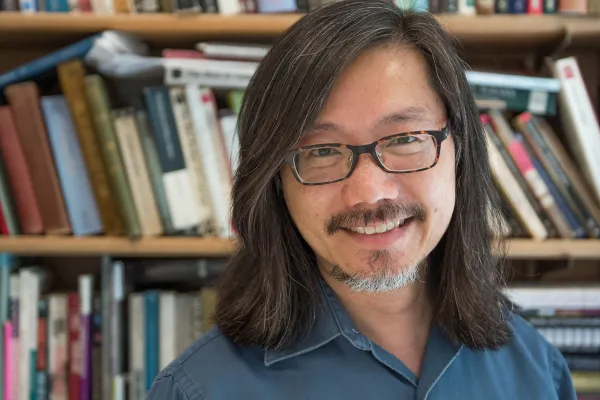‘Inclusion is Not a Fixed Point’
Campus Life

Published November 13, 2019
Floyd Cheung, Smith’s vice president for equity and inclusion, brings what he calls a “growth mindset” to his role on campus.
“Equity and inclusion is not a fixed point; it’s not something you either have or you don’t,” he explains. “We work on the principle that we can get better at this together. It’s a goal we keep working toward.”
Cheung—who is a professor of English language and literature and American studies at Smith—serves as a member of President Kathleen McCartney’s cabinet, overseeing an office that now encompasses the Office of Multicultural Affairs and the Center for Spiritual and Religious Life.
On Otelia Cromwell Day, Cheung announced several new initiatives aimed at creating a more equitable campus, including:
- hiring new staff to expand capacity and focus on the needs of underrepresented students;
- mapping existing inclusion and equity efforts to highlight ongoing work on campus and identify gaps;
- forming action teams to work on specific “Inclusion in Action” themes to help ensure that all students, faculty and staff feel engaged in the life of the college.
Here’s what else Cheung had to say about his work on campus:
What drew you to want to lead Smith’s Office of Equity and Inclusion?
“I have always cared about this kind of work at Smith, and I’ve always tried to do it from where I was—in my classes and as director of the Sherrerd Center for Teaching and Learning. Now, I have a chance to do this work at a higher level. I’ve also realized I don’t want to do this anywhere else but Smith, because I feel so at home here. I think Smith has been ready for change for a while. I believe I’m in a position to help speed things up.”
How has “Inclusion in Action” work moved forward since last year’s April 10 event?
“One of the promises of April 10 was that it was not going to be a one-shot effort. Over the summer, a hardworking committee reviewed data from that event and came up with important themes we heard expressed in surveys and in student demands presented on April 11.
On Otelia Cromwell Day, we announced the creation of action teams around those themes. One of their first jobs is going to be to review a map we’re creating of equity efforts on campus—the first time we’ve done this kind of mapping. The teams will also be reviewing applications for the Innovation Challenge grants, which this year are going to be focused on equity and inclusion. We get to drive that grant program in partnership with the Provost’s Office for proposals that help ensure everyone can enjoy what Smith is and has to offer.”
Your office has also hired new staff. What will their responsibilities be?
“Raven Fowlkes-Witten ’17 has been hired full-time to serve as program and outreach coordinator, and the point person for undocumented, trans and gender-nonconforming students on campus. We are also about to hire our first in-house facilitator/trainer to serve as a point person for low-income and first-generation students, and to help us think about how we structure trainings for Title IX and other trainings. We hope to have that person in place by the end of the fall.”
What are your other priorities?
“In the short term, we’re going to be practicing anti-racism by taking steps to repair the harm that our students have told us results from the n-word being used. Students led an event on campus recently where they shared their stories and awakened us to the pain they’ve experienced. I’m going to be working with the Provost’s Office to make faculty aware of what students shared about the n-word and how it affects learning in the classroom.
“In the medium term, we are forming affinity groups for faculty and staff, similar to the affinity organizations that students have. A third priority is long-term work with Inclusion In Action. We’ve revived the Inclusion Council that used to report to the President’s Office and now reports to me. I reached out to everyone on the council to ask if they wanted to continue and have also recruited people to fill representation gaps on the council.”
How can Smith community members get involved in the work of your office?
“People can submit ideas to us about what needs to be changed in any one of the Inclusion in Action areas. They can also look at and contribute to the map of ongoing work to help us see what’s missing. And they can apply for Innovation Challenge grants!
“Having a growth mindset means that we are going to make mistakes and be out of our comfort zones in doing this work. It’s important for people to know that I am supported, and I’m collaborating across the campus with students, faculty and staff. As long as we work together, we can accomplish good things.”